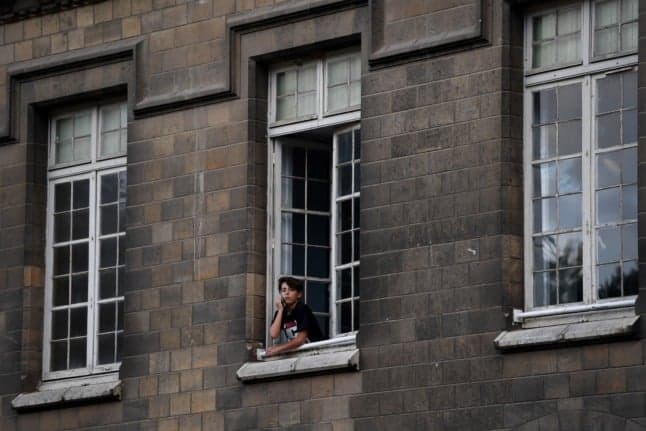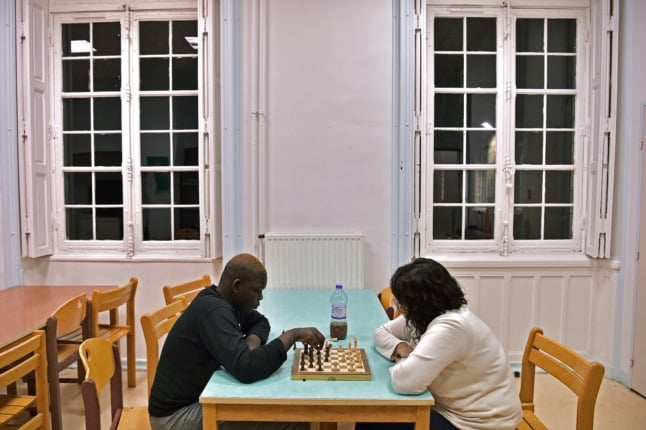Why so many French children are sent to boarding school

Over 200,000 children attend boarding schools in France, but the experience is very different to the image we may have from English-language TV and film. A government project aims to make them more attractive.
It's not something many people associate with France, but it's a lot more common than you might think.
For the 2019-20 academic year, 166,000 French pupils stayed at one of the country's 1,529 public boarding schools - that's 3.5 percent of all pupils. Approximately 50,000 more attend 600 private boarding schools.
For comparison, there are around 500 boarding schools in the UK in total, according to the British Council, and most of those are private.
So why are there so many in France?
Who goes to boarding school in France
If France is not synonymous with boarding schools to the same extent as the UK, it could be because they mostly serve a different purpose.
Boarding schools played an important role in providing access to education in France until the 1960s, but have since faded from view following a significant rural exodus.
However, to this day, most boarding schools in France exist to solve geographical problems, especially when they offer a type of education that isn't found everywhere. Many French adolescents live at their school during the week, because it offers the opportunity to specialise in a particular subject which closer schools don't teach. An agricultural college, for example, or a school which offers a special language or aeronautics programme.
Far from limiting themselves to teaching the classics, boarding schools in France are often geared towards more technical skills. Over two thirds of those attending a public boarding school in France go to a lycée général or technologique (general or technological high schools), while a quarter are in lycées professionnels (technical colleges), and just over 4 percent are enrolled in a collège (secondary school).

A chess game at the boarding school at the Apprentis d'Auteuil-managed Saint-Philippe school in Meudon outside Paris. Photo: CHRISTOPHE ARCHAMBAULT / AFP.
In rural Burgundy, out of 207 secondary and high school structures (including secondary schools which have a technical college or high school attached), 62 offer boarding.
"In sectors where there is not necessarily an overabundance of schooling options, students are more likely to go to boarding schools," Christophe Bourse, an adviser to the education officer in the Dijon area, told The Local.
This is often a question of specialisation. According to Bourse, it is more common for technical qualifications such as a baccalauréat professionnel to require students to travel further afield, even if there is a high level of coverage across the region, while others choose boarding schools in order to specialise in high-level sports or cultural subjects such as music or art.
Sometimes, though, in more rural areas, students "choose boarding schools because they're 30 or 40 minutes away from a lycée, so they prefer to stay there because there aren't necessarily a lot of trains."
How much it costs
Contrary to the expensive boarding school fees in other countries, in French state schools, the average family spends around €1,400 per year on accommodation, according to the education ministry.
On top of that, students who already receive a means-tested bourse (grant) are eligible for an additional annual sum of between €327 and €672 to help with boarding costs.
Of course, more expensive options do exist for those who can afford them, such as the Ermitage International School in Maisons-Laffitte outisde of Paris, where tuition can cost up to €30,724 a year for seven-day boarding.
Why the French government is developing boarding schools
The French government is currently in the process of mordernising its boarding school network. 3,000 boarding school places are set to be renovated, while almost 1,500 new places will be created for students by September 2022.
Earlier this year 307 schools were labelled internats d'excellence (excellence boarding schools). These schools offer additional educational support, as well as proposing a strong focus, such as a foreign language or sports programme, or a particular technical vocation. You can find a map of all these boarding schools here.
54 of those school projects were co-financed by France's Covid recovery plan, which dedicated €50 million to boarding schools, while the rest of the funding came from other sources, notably local authorities.
"We want to be done with the idea of the 'lycée mobylette' [moped high school], in other words, the high school you go to because it's closest to your home," Blanquer told the Senate in 2019.
Boarding schools are considered a means of encouraging students, particularly those in rural areas, to make informed choices about their future, rather than choosing a path "by default".
In theory at least, the government sees excellence boarding schools as a tool of equality. As well as those living in rural areas, the scheme is also designed to benefit students from the quartiers prioritaires de la politique de la ville - "priority neighbourhoods" with high rates of poverty.
Rather than selecting pupils based on grades, priority will be given to students in need of extra help, such as those who "do not benefit from an environment which is favourable towards succeeding in their studies". This could refer to a family setting or wider social environment which is not conducive to academic success.
A civil servant working on the project told The Local that the more attractive image associated with British boarding schools - partly due to Harry Potter, as well as the uniform and sense of belonging - inspired the education ministry to try to change the way French boarding schools are perceived.
That does not however mean they are about to become exclusive. So the next time somebody from France tells you they went to boarding school, that might not say what you think it does about their background.
Comments
See Also
It's not something many people associate with France, but it's a lot more common than you might think.
For the 2019-20 academic year, 166,000 French pupils stayed at one of the country's 1,529 public boarding schools - that's 3.5 percent of all pupils. Approximately 50,000 more attend 600 private boarding schools.
For comparison, there are around 500 boarding schools in the UK in total, according to the British Council, and most of those are private.
So why are there so many in France?
Who goes to boarding school in France
If France is not synonymous with boarding schools to the same extent as the UK, it could be because they mostly serve a different purpose.
Boarding schools played an important role in providing access to education in France until the 1960s, but have since faded from view following a significant rural exodus.
However, to this day, most boarding schools in France exist to solve geographical problems, especially when they offer a type of education that isn't found everywhere. Many French adolescents live at their school during the week, because it offers the opportunity to specialise in a particular subject which closer schools don't teach. An agricultural college, for example, or a school which offers a special language or aeronautics programme.
Far from limiting themselves to teaching the classics, boarding schools in France are often geared towards more technical skills. Over two thirds of those attending a public boarding school in France go to a lycée général or technologique (general or technological high schools), while a quarter are in lycées professionnels (technical colleges), and just over 4 percent are enrolled in a collège (secondary school).

In rural Burgundy, out of 207 secondary and high school structures (including secondary schools which have a technical college or high school attached), 62 offer boarding.
"In sectors where there is not necessarily an overabundance of schooling options, students are more likely to go to boarding schools," Christophe Bourse, an adviser to the education officer in the Dijon area, told The Local.
This is often a question of specialisation. According to Bourse, it is more common for technical qualifications such as a baccalauréat professionnel to require students to travel further afield, even if there is a high level of coverage across the region, while others choose boarding schools in order to specialise in high-level sports or cultural subjects such as music or art.
Sometimes, though, in more rural areas, students "choose boarding schools because they're 30 or 40 minutes away from a lycée, so they prefer to stay there because there aren't necessarily a lot of trains."
How much it costs
Contrary to the expensive boarding school fees in other countries, in French state schools, the average family spends around €1,400 per year on accommodation, according to the education ministry.
On top of that, students who already receive a means-tested bourse (grant) are eligible for an additional annual sum of between €327 and €672 to help with boarding costs.
Of course, more expensive options do exist for those who can afford them, such as the Ermitage International School in Maisons-Laffitte outisde of Paris, where tuition can cost up to €30,724 a year for seven-day boarding.
Why the French government is developing boarding schools
The French government is currently in the process of mordernising its boarding school network. 3,000 boarding school places are set to be renovated, while almost 1,500 new places will be created for students by September 2022.
Earlier this year 307 schools were labelled internats d'excellence (excellence boarding schools). These schools offer additional educational support, as well as proposing a strong focus, such as a foreign language or sports programme, or a particular technical vocation. You can find a map of all these boarding schools here.
54 of those school projects were co-financed by France's Covid recovery plan, which dedicated €50 million to boarding schools, while the rest of the funding came from other sources, notably local authorities.
"We want to be done with the idea of the 'lycée mobylette' [moped high school], in other words, the high school you go to because it's closest to your home," Blanquer told the Senate in 2019.
Boarding schools are considered a means of encouraging students, particularly those in rural areas, to make informed choices about their future, rather than choosing a path "by default".
In theory at least, the government sees excellence boarding schools as a tool of equality. As well as those living in rural areas, the scheme is also designed to benefit students from the quartiers prioritaires de la politique de la ville - "priority neighbourhoods" with high rates of poverty.
Rather than selecting pupils based on grades, priority will be given to students in need of extra help, such as those who "do not benefit from an environment which is favourable towards succeeding in their studies". This could refer to a family setting or wider social environment which is not conducive to academic success.
A civil servant working on the project told The Local that the more attractive image associated with British boarding schools - partly due to Harry Potter, as well as the uniform and sense of belonging - inspired the education ministry to try to change the way French boarding schools are perceived.
That does not however mean they are about to become exclusive. So the next time somebody from France tells you they went to boarding school, that might not say what you think it does about their background.
Join the conversation in our comments section below. Share your own views and experience and if you have a question or suggestion for our journalists then email us at [email protected].
Please keep comments civil, constructive and on topic – and make sure to read our terms of use before getting involved.
Please log in here to leave a comment.